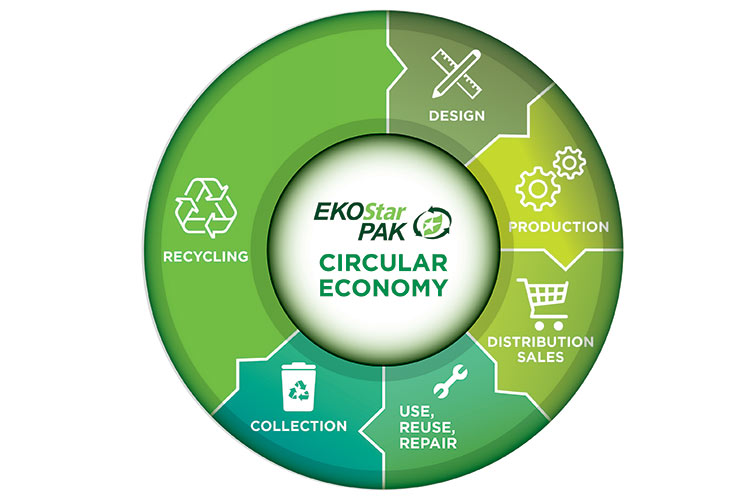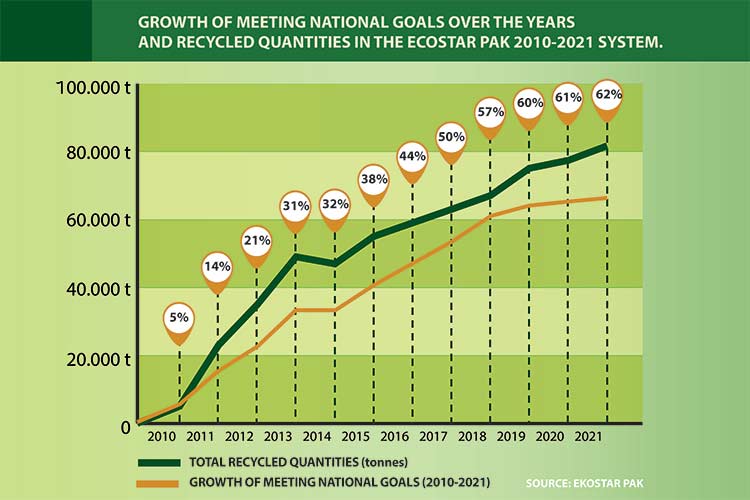Ekostar Pak is a national Operater of packaging waste management system. In terms of its number of clients, which exceeds 800, it is the Serbian market leader, with a market share of 34% in total amounts of packaging placed on Serbian market
Comparative data collected over the course of the past decade show that the amount of waste recycled in Serbia by Ekostar increases every year. Provided the direction of growth is maintained, the full scope of national targets linked to the reduction of packaging and packaging waste could become achievable.
We often here talk of the circular economy, which is something that citizens actually know very little about. What lurks behind this notion?
The circular economy represents the “product- waste-product” model and is an ecological alternative to the inefficient “take-make-use-discard” system. More simply put, the key difference between these two models is reflected in the way they treat waste: does it end up dumped in landfill sites, where it slowly decomposes, polluting water, soil and air, before returning to nature; or does it, instead, through recycling, return to the production process to be used again for the same purpose or a similar one. The way waste circulates is dependent on all of us.
Is waste management the first step towards a circular economy?
The state and institutions are creating a normative framework that should integrate circular economy principles from the local to the national level. The principle of extended responsibility of the producer towards the packaging in which its product is sold represents a key pillar for the economy’s integration into the circular model. Finally, the willingness and readiness of all of us to approach waste responsibly, in accordance with regulations, but also natural law, ensures the cycle of the circular economy is complete.
The European Union adopted an action plan in 2020 that should ensure that there are no emissions of greenhouse gases at the level of the entire European community by 2050. With this goal in mind, the Government of the Republic of Serbia adopted its Programme of Waste Management in the Republic of Serbia for the 2022-2031 period, which should enable the creating of preconditions for utilising waste in the circular economy. This ambitious policy certainly famous numerous challenges in practise, but successful examples aren’t a rarity either.

We often think that everything can be recycled. However, in order for waste to be able to become a resource, it is essential for its disposal to be controlled through the existence of clear rules of separation. If we carefully examine the packaging we use, we will see that every package displays codes in letters and numbers that the producer is obliged to highlight, as instructions for proper disposal following use. There are multiple benefits of adhering to this disposal rule.
Could you illustrate that to us with some specific statistics?
As an example, paper separated from food leftovers, glass or plastic will not be dumped in nature somewhere, but rather returned to industry and processed in an appropriate way. This will simultaneously satisfy industry’s need for paper without the use of additional natural resources, which serves to address another major ecological challenge. Properly separated waste was a precondition for the recycling of more than 80,000tons of packaging waste 50,000 tons of paper,8,300 tons of plastic, 9,600 tons of glass, 5,000 tons of metal and 7,100 tons of wood – which is how much Ekostar Pak managed to return to the cycle of reuse with its recycling system in 2021 alone.
In our country we should start introducing the model of collecting three separate categories of waste: paper/ cardboard, plastic/metal and glass
We commonly simplify the recycling issue, because we don’t know how waste is properly sorted. Is that the first step to successful recycling, if not the key?
There are various waste collection models. The Programme of Waste Management in the Republic of Serbia envisaged the first step as being the minimal separating of communal waste in households into two bins, one for recyclable materials and another for all other waste. However, experience has shown that not all waste collected in this way can be utilised by the recycling industry. Specifically, the industry requires raw materials that haven’t been contaminated by other impurities. It turned out that the “two bins” system doesn’t ensure the high quality of the materials collected, even if secondary separation is introduced, particularly when we want to incorporate the raw material obtained into new packaging that will serve the needs of food products, rather than being sent to be incinerated or landfilled.

What kind of recycling model do you advocate for?
I consider that it would be far more beneficial to start introducing the model of collecting three separate categories of waste: paper/cardboard, plastic/metal and glass. Such a way of separating enables the harvesting of high-quality raw materials and the fulfilling of specific prescribed goals for each material. Secondly, the costs of dividing waste into three groups justified recycling, because it reduces the costs of sorting and increases the value of material sorted for further use. Next, changing daily routines is an important incentive for increasing respect for the principles of the circular economy across the entire community, and has a direct impact on protecting the environment. Furthermore, applying the circular economy model contributes to raising competitiveness, innovation and economic growth, alongside significant potential for the creation of new jobs. Finally, by changing economic principles and our daily lives, we add value to waste materials and preserve the precious and increasingly scarce natural resources and the environment to which we belong.
The Programme that’s been adopted envisages current national targets for the reduction of packaging and packaging waste to match EU targets in 2025. Besides this challenge, the Programme also envisages that we will introduce the required separation of waste into paper, plastic, glass and metal by 2029, so we have quite a difficult task ahead of us, because we will have to shorten this deadline if we want to achieve the planned goals.
Are things changing for the better? Is there a shift in the right direction?
Space needs to be created for improvement in the form of systemic steps in the area of primary selection, and that should be done through cooperation with units of local government. This means that it’s necessary to secure infrastructure nationwide throughout Serbia, in both larger and smaller areas, in order for citizens to be able to recycle waste unhindered. The capacities of existing landfills have already been filled in a large number of municipalities, which is why the Programme of Waste Management envisages their overhaul or closure.
What we can see on a daily basis is that interest in recycling exists among citizens, and initiatives to promote primary selection, such as the campaign being conducted by Ekostar Pak in all 27 schools on the territory of Pančevo that’s directed towards raising awareness among young people that recycling is part and parcel of responsible behaviour and inclusion in the circle of nature conservation. As such, the key to improving the situation in this area lies in a systemic solution that implies synergy between the economy and the state, that is a joint model of system operators and local government units entrusted with collecting municipal packaging waste.